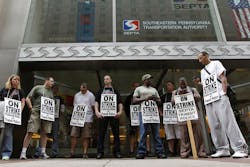Settlement Ends Pennsylvania Transit Police Strike
Striking transit police began returning to their SEPTA posts Friday night after reaching a tentative settlement to end their nine-day strike earlier in the evening.
Details of the settlement were not immediately disclosed, but the police can expect an 11.5 percent salary increase over five years and a $1,250 bonus upon ratification, based on the pattern contract approved by other SEPTA unions.
The sticking point in the strike had been a 35-cent-an-hour difference in "certification" pay between the union's demand and SEPTA's offer.
The Fraternal Order of Transit Police went on strike March 21. The 219 police had been working without a contract since their last pact expired March 31, 2011.
The two sides announced a tentative agreement Friday shortly before 9 p.m. Officers were told to begin reporting at 10 p.m. and to have the force fully staffed by midnight.
The current starting annual salary for officers is $34,612, topping out at $57,351. SEPTA says that, including overtime pay, the typical officer now collects $62,789 a year.
The transit police were seeking the certification pay as a way of getting a small additional increase beyond the pattern set by the TWU contract. The police union wanted 50 cents an hour, while SEPTA offered 15 cents an hour.
Officers must meet annual police-certification requirements to keep their jobs. The union argued that the officers should be paid extra for meeting those requirements, as are SEPTA locomotive engineers, who get a 57-cents-an-hour certification payment.
The police union argued that a state fact-finder, brought in by the Pennsylvania Labor Relations Board last year, endorsed other increases, such as higher meal payments and uniform allowances, that would have cost SEPTA much more than the 50 cents an hour they are seeking.
And the police saw the 50-cent-an-hour boost as a way to build a higher base on which to build future contracts.
SEPTA said the increase would prompt similar demands from its other 16 unions and cost the transit agency millions of dollars as it struggles with tight funding restrictions from Harrisburg.
Unlike city police and firefighters, who are forbidden from striking, transit police are not allowed to take their wage and benefit demands to binding arbitration, where a three-member panel determines the final outcome.
Copyright 2012 Philadelphia Newspapers, LLCAll Rights Reserved




